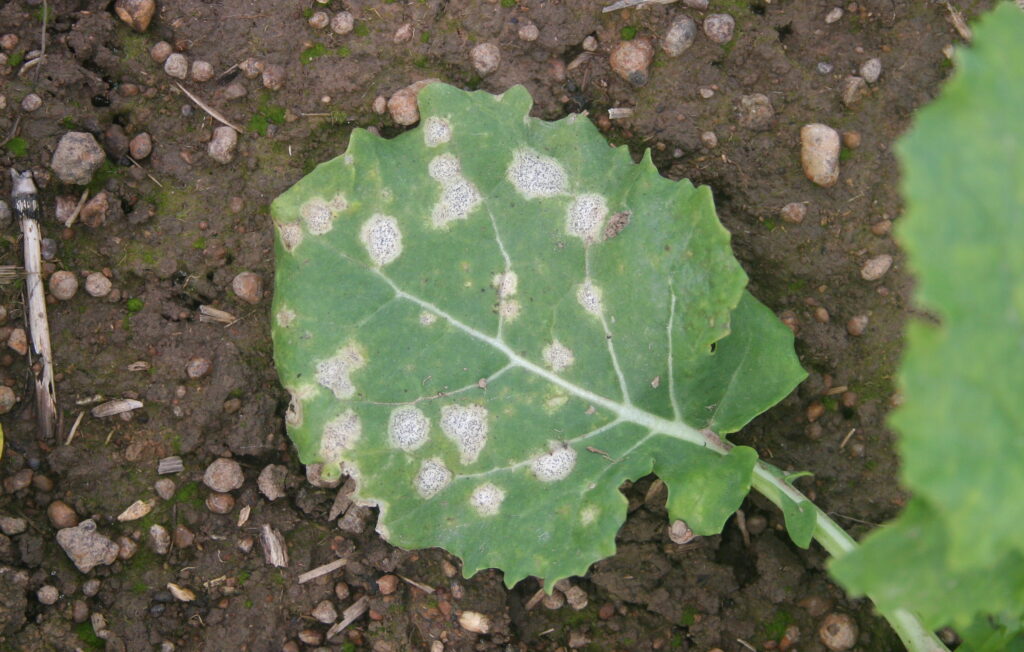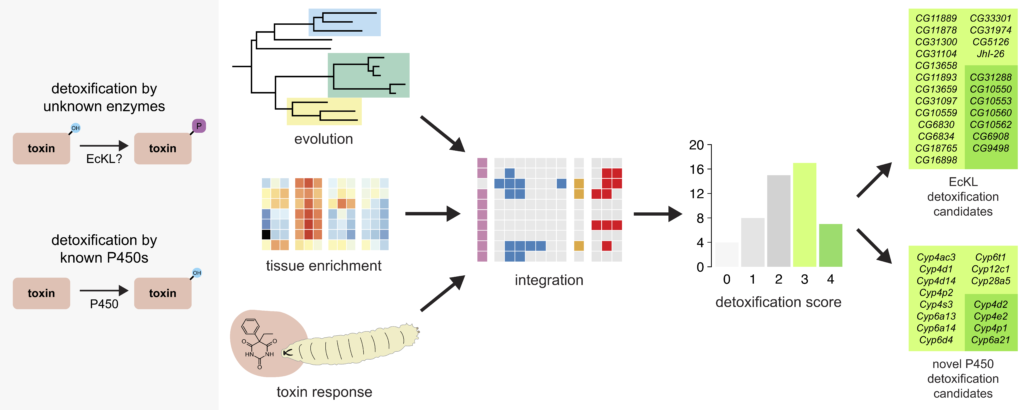I recently became a Research Scientist at Agriculture Victoria, working on the bioinformatics behind metabarcoding approaches to study the spread of insect and fungal agricultural pests. I’ll have more to share about this work soon, I’m sure!
Previously, I worked as a Post-Doctoral Fellow in Genetics (2020–2022) in the Mycology Lab (School of BioSciences, The University of Melbourne) with Alexander Idnurm and Angela Van de Wouw, studying the fungal plant pathogen Leptosphaeria maculans, the cause of blackleg, a devastating agricultural disease that affects canola (Brassica napus) crops in Australia and many other countries.

I used genomic, molecular and population genetic methods to explore the evolution of fungicide resistance in L. maculans, as well as establish and coordinate a new international collection of fungal isolates to use as a panel of genetic variation for this species.
My PhD research (2016–2020) in the Robin Lab (School of BioSciences, The University of Melbourne) focused on a poorly characterised group of genes in insects called the ecdysteroid kinase-like (EcKL) gene family.

Using comparative phylogenomic methods and the powerful reverse genetics toolkit of Drosophila melanogaster, I found that EcKL genes are likely a novel detoxification family in insects and modulate susceptibility to natural toxins found in plants and fungi. Unsurprisingly, some EcKLs also encode enzymes that appear to modulate ecdysteroid hormone activity and may coordinate unknown aspects of insect endocrinology.
Publications
* Corresponding author
# Co-first author
2024
Scanlan, J.L.., & Robin, C. (preprint) Genetic characterisation of candidate ecdysteroid kinases in Drosophila melanogaster. bioRxiv. doi.org/10.1101/2024.01.22.576657
Scanlan, J.L., Idnurm, A., & Van de Wouw, A.P. (in press) Genome-wide mapping in an international isolate collection identifies a trans-continental erg11/CYP51 promoter insertion associated with fungicide resistance in Leptosphaeria maculans. Plant Pathology. doi.org/10.1111/ppa.13898
Scanlan, J.L., & Robin, C. (2024) Phylogenomics of the Ecdysteroid Kinase-Like (EcKL) Gene Family in Insects Highlights Roles in Both Steroid Hormone Metabolism and Detoxification. Genome Biology and Evolution, 16, 2. doi.org/10.1093/gbe/evae019
2023
Van de Wouw, A.P.#, Scanlan, J.L.#, Al-Mamun, H.A, Balesdent, M.H., Bousset, L., Burketová, L., del Rio Mendoza, L., Fernando, W.G.D., Franke, C., Howlett, B.J., Huang, Y., Jones, E.E., Koopmann, B., Lob, S., Mirabadi, A.Z., Nugent, B.C., Peng, G., Rossi, F.R., Schreuder, H., Tabone, A.R., Van Coller, G.J., Batley, J., & Idnurm, A. (2023) A new set of international Leptosphaeria maculans isolates as a resource for elucidation of the basis and evolution of blackleg disease on Brassica napus. Plant Pathology, 73(1), 170–185. doi.org/10.1111/ppa.13801
Scanlan, J.L., Mitchell, A.C., Marcroft, S.J., Forsyth, L.M., Idnurm, A., & Van de Wouw, A.P. (2023). Deep amplicon sequencing reveals extensive allelic diversity in the erg11/CYP51 promoter and allows multi-population DMI fungicide resistance monitoring in the canola pathogen Leptosphaeria maculans. Fungal Genetics and Biology, 168, 103814. doi.org/10.1016/j.fgb.2023.103814 (preprint of accepted manuscript: doi.org/10.26188/21321027)
Scanlan, J.L.*, Robin, C., & Mirth, C.K. (2023). Rethinking the ecdysteroid source during Drosophila pupal–adult development. Insect Biochemistry and Molecular Biology, 152, 103891. doi.org/10.1016/j.ibmb.2022.103891 (preprint of accepted manuscript: doi.org/10.26188/20506812)
2022
Scanlan, J.L., Battlay, P.L., & Robin, C. (2022). Ecdysteroid kinase-like (EcKL) paralogs confer developmental tolerance to caffeine in Drosophila melanogaster. Current Research in Insect Science, 2, 100030. doi.org/10.1016/j.cris.2022.100030 (preprint of manuscript: doi.org/10.1101/2021.09.15.460555)
2021
Van de Wouw, A.P., Scanlan, J.L., Marcroft, S.J., Smith, A.J., Sheedy, E.M., Perndt, N.W., Harrison, C.E., Forsyth, L.M., & Idnurm, A. (2021). Fungicide sensitivity and resistance in the blackleg fungus, Leptosphaeria maculans, across canola growing regions in Australia. Crop and Pasture Science, 72(12), 994-1007. doi.org/10.1071/cp21369
Van de Wouw, A.P., Marcroft, S.J., Sprague, S.J., Scanlan, J.L., Vesk, P.A., & Idnurm, A. (2021). Epidemiology and management of blackleg of canola in response to changing farming practices in Australia. Australasian Plant Pathology, 51, 1–13. doi.org/10.1007/s13313-020-00767-9
2020
Scanlan, J.L., Gledhill-Smith, R.S., Battlay, P., & Robin, C. (2020). Genomic and transcriptomic analyses in Drosophila suggest that the ecdysteroid kinase-like (EcKL) gene family encodes the ‘detoxification-by-phosphorylation’ enzymes of insects. Insect Biochemistry and Molecular Biology, 123, 103429. doi.org/10.1016/j.ibmb.2020.103429 (preprint of manuscript: doi.org/10.1101/2020.02.17.951962)
2019
Perry, C., Scanlan, J., & Robin, C. (2019). Mining insect genomes for functionally affiliated genes. Current Opinion in Insect Science, 31, 114–122. doi.org/10.1016/j.cois.2018.12.006
Grants
2022 Early Career Researcher Grant ($33,846.70) — The University of Melbourne
2021 EMRI Research Grant ($9,360) — Environmental Microbiology Research Initiative, The University of Melbourne
2016–2019 Australian Postgraduate Award/Australian Government Research Training Program Scholarship
Awards
2021 Best Oral Presentation (2nd Prize) — Australasian Plant Pathology Society Biennial Conference 2021
2019 Best PhD Speaker — Australian Fly Meeting 2019
2019 Mayo Prize (Best Student Presentation) — Annual Conference of the Genetics Society of AustralAsia 2019
2018 Best PhD Poster — Australian Fly Meeting 2019
2016 Genetics Research Award — School of BioSciences, The University of Melbourne
Teaching
2021–2022 Guest Lecturer, “COMP90016: Computational Genomics” — Faculty of Medicine, Dentistry & Health Sciences, The University of Melbourne
Conference Organisation
2021 Session Chair, “Genomics and Transcriptomics” — Annual Conference of the Genetics Society of AustralAsia 2021
Conference Presentations
Extensive structural variation in the promoter of erg11/CYP51 confers widespread resistance to DMI fungicides in the canola pathogen Leptosphaeria maculans. Poster presentation at ComBio2022, Melbourne, Australia, 2022.
Extensive allelic variation at the target gene ERG11/Cyp51 confers widespread resistance to DMI fungicides in the canola pathogen Leptosphaeria maculans. Oral presentation at the Australasian Plant Pathology Society Biennial Conference, online, 2021. Awarded 2nd place prize for Best Oral Presentation.
Finding ecdysteroid kinases in Drosophila melanogaster with genetics (or: The Quirks of Studying a Wallflower). Oral presentation at the Australian Fly Meeting, Warburton, Australia, 2019. Awarded prize for Best PhD Speaker.
Multiple lines of evidence suggest non-canonical detoxification by phosphorylation via the ecdysteroid kinase-like (EcKL) gene superfamily in insects. Oral presentation at the Annual Conference of the Genetics Society of AustralAsia, Melbourne, Australia, 2019. Awarded Mayo Prize for Best Student Speaker.
CG13813 is a putative ecdysteroid kinase gene in Drosophila melanogaster. Poster presentation at the Annual Conference of the Genetics Society of AustralAsia, Melbourne, Australia, 2019.
Comparative phylogenomic evidence for a novel detoxification gene family in insects. Poster presentation at the Australian Fly Meeting, Warburton, Australia, 2018. Awarded prize for Best PhD Poster.
Identification and functional characterisation of two putative ecdysteroid kinases in Drosophila. Poster presentation at the 59th Annual Drosophila Research Conference, Philadelphia, USA, 2018.
Comparative phylogenomic evidence for a novel detoxification gene family in insects. Poster presentation at the 39th Annual Lorne Genome Conference, Lorne, Australia, 2018.
A putative ecdysteroid 26-kinase gene in Drosophila. Oral presentation at the Australian Fly Meeting, Warburton, Australia, 2017.
Identification and characterisation of two putative ecdysteroid kinases in Drosophila melanogaster. Poster presentation at the Annual Conference of the Genetics Society of AustralAsia with the New Zealand Society for Biochemistry and Molecular Biology, Dunedin, New Zealand, 2017.
Ecdysteroid kinases in Drosophila. Oral presentation at the Australian Fly Meeting, Warburton, Australia, 2016.
Building an evolutionary framework for the functional characterisation of an arthropod-specific gene family. Poster presentation at the Society for Molecular Biology and Evolution annual meeting, Gold Coast, Australia, 2016.
The function and evolution of a novel kinase family in Drosophila. Oral presentation at the Australian Fly Meeting, Warburton, Australia, 2014.
Professional Associations
2019–Present Genetics Society of AustralAsia — Webmaster and Member
2018–Present Genetics Society of America — Member
Peer Reviewing
European Journal of Plant Pathology
Fungal Genetics and Biology
Genetics
Molecular Ecology
Assisted Research
This is where I’ve helped out in some small way or another with someone else’s research, but I’m not an author on the published paper.
Stewart, M. K., Mattiske, D. M., & Pask, A. J. (2021). Oestrogen regulates SOX9 bioavailability by rapidly activating ERK1/2 and stabilising microtubules in a human testis-derived cell line. Experimental Cell Research, 398(2), 112405. doi.org/10.1016/j.yexcr.2020.112405
Stewart, M. K., Mattiske, D. M., & Pask, A. J. (2020). Estrogen suppresses SOX9 and activates markers of female development in a human testis-derived cell line. BMC Molecular and Cell Biology, 21(1), 66. doi.org/10.1186/s12860-020-00307-9
Armisén, D., Rajakumar, R., Friedrich, M., Benoit, J. B., Robertson, H. M., Panfilio, K. A., et al. (2018). The genome of the water strider Gerris buenoi reveals expansions of gene repertoires associated with adaptations to life on the water. BMC Genomics, 19(1), 832. doi.org/10.1186/s12864-018-5163-2
 https://orcid.org/0000-0001-9163-2203
https://orcid.org/0000-0001-9163-2203